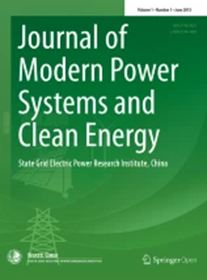孤岛微电网智能驱动成网变换器控制
IF 6.1
1区 工程技术
Q1 ENGINEERING, ELECTRICAL & ELECTRONIC
Journal of Modern Power Systems and Clean Energy
Pub Date : 2025-03-07
DOI:10.35833/MPCE.2024.001157
引用次数: 0
摘要
在分布式能源渗透率较高的现代微电网中,系统重构更为频繁,成为一个重要问题。固定参数控制器可能无法有效地处理这些任务,因为它们缺乏适应此类环境中动态条件的能力。提出了一种基于鲁棒性引导神经网络(RNN)的智能驱动成网变换器孤岛化控制方法。为了提高该方法的适应性,将GFM主控制回路中的传统比例积分控制器完全替换为RNN。RNN通过鲁棒性指导策略进行训练,以复制其鲁棒性行为。所有的训练阶段都是纯粹的数据驱动方法,这意味着控制器设计不需要系统参数。因此,该方法是一种智能驱动的无模型GFM变换器控制方法。与传统方法相比,在所有测试场景下的仿真结果都表明了该方法的优越性。该方法减少了超过71.24%的超调量,使所有阻尼比保持在稳定区域内,并提供了更快的稳定。与传统方法相比,在最大概率下,该方法的阻尼提高了14.7%以上,频率和电压的变化率降低了59.97%以上。此外,该方法有效地抑制了由基于逆变器的资源(频率范围为1.0 Hz至1.422 Hz)引起的状态变量之间的相互作用。因此,这些频率对观测到的瞬态响应的贡献小于19.79%。本文章由计算机程序翻译,如有差异,请以英文原文为准。
Intelligence-Driven Grid-Forming Converter Control for Islanding Microgrids
In modern microgrids (MGs) with high penetration of distributed energy resources (DERs), system reconfiguration occurs more frequently and becomes a significant issue. Fixed-parameter controllers may not handle these tasks effectively, as they lack the ability to adapt to the dynamic conditions in such environments. This paper proposes an intelligence-driven grid-forming (GFM) converter control method for islanding MGs using a robustness-guided neural network (RNN). To enhance the adaptability of the proposed method, traditional proportional-integral controllers in the GFM primary control loops are entirely replaced by the RNN. The RNN is trained by a robustness-guided strategy to replicate their robust behaviors. All the training stages are purely data-driven methods, which means that no system parameters are required for the controller design. Consequently, the proposed method is an intelligence-driven modelless GFM converter control. Compared with traditional methods, the simulation results in all testing scenarios show the clear benefits of the proposed method. The proposed method reduces overshoots by more than 71.24%, which keeps all damping ratios within the stable region and provides faster stabilization. In comparison to traditional methods, at the highest probability, the proposed method improves damping by over 14.7% and reduces the rates of change of frequency and voltage by over 59.97%. Additionally, the proposed method effectively suppresses the interactions between state variables caused by inverter-based resources, with frequencies ranging from 1.0 Hz to 1.422 Hz. Consequently, these frequencies contribute less than 19.79% To the observed transient responses.
求助全文
通过发布文献求助,成功后即可免费获取论文全文。
去求助
来源期刊

Journal of Modern Power Systems and Clean Energy
ENGINEERING, ELECTRICAL & ELECTRONIC-
CiteScore
12.30
自引率
14.30%
发文量
97
审稿时长
13 weeks
期刊介绍:
Journal of Modern Power Systems and Clean Energy (MPCE), commencing from June, 2013, is a newly established, peer-reviewed and quarterly published journal in English. It is the first international power engineering journal originated in mainland China. MPCE publishes original papers, short letters and review articles in the field of modern power systems with focus on smart grid technology and renewable energy integration, etc.
 求助内容:
求助内容: 应助结果提醒方式:
应助结果提醒方式:


